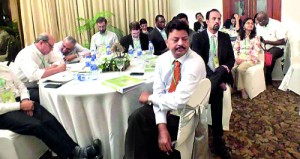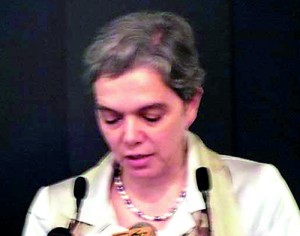South Asian mayors discuss rapid urbanisation issues and transformation of cities
Local legislators from South Asia last week discussed a range of issues on rapid urbanization with the views focusing on common challenges like informal settlements, deteriorating levels of urban infrastructure among other issues.
The two-day workshop of the South Asian Mayors’ Forum on ‘Urban Transformation’ held in Kandy organised by the World Bank (WB), also revealed that there are opportunities to transform cities and economies to reach high development in prosperity and livability.
The WB noted that since the turn of the century, about 130 million live in the towns and cities of South Asia and yielded productivity benefits. By 2030 the population in these cities would swell to 315 million.

Delegates
The workshop was for the ‘City Fathers’ of the region to arrive at a consensus by discussion and sharing experiences to carry out urban transformation in a process that is sustainable, environmentally friendly and inclusive of the people in the region. The countries represented were Sri Lanka, India, Bhutan, Nepal, Philippines, Maldives, Pakistan, Bangladesh, and an outsider (country) – South Korea.
Environmental protection, social needs paramount
Francoise Clottes, WB’s Country Director, Sri Lanka and the Maldives, in her opening remarks said that the WB in the next two years is organising knowledge events on urbanisation in the South Asian region and stressed that well managed urbanisation could create opportunities with innovation and new ideas to save energy, land and natural resources, managing climate and the risk of disasters.
Globally, almost 80 per cent of GDP is generated in cities, she pointed out, and said that it would be difficult for any country to reach middle income status and beyond without getting urbanisation right. “So the stakes are high,” Ms. Clottes said, noting that the process to benefit the people there should be strong leadership without compromising environmental protection and social needs.
She said that Sri Lanka has overcome development challenges to move people out of poverty and to share prosperity and now Sri Lanka is focussing on new challenges. WB has been for the last six decades involved in a development partnership with Sri Lanka and is . now celebrating the 60th anniversary of the first WB loan for Aberdeen and Lakshapana power projects. She said, “Since then, our

World Bank Country Director
partnership has evolved and changed significantly”. She said that they were encouraged to see many changes with their assistance, in different sectors such as health, education, transport and urbanisation to name a few. The WB supports Sri Lanka in the urban sector through another large project, which was approved a few days for Kandy and Galle.
The discussions and the sharing of experiences was facilitated and made easy by two resource persons with their key note addresses. Peter Ellis, Lead Economist, South Asia Urban Unit, WB spoke on ‘Leverage Urbanisation’ while Paul Smoke, Professor of Public Finance and Planning and Director of International Programmes, New York University spoke on ‘Governing and Financing More Effective Urban Governments in South Asia: Initial Thoughts’.
Mr. Smoke spoke of challenges in effective local government systems; SAR Intergovernmental Systems: Structures, Finances, Governance; Strengthening LGs and Empowerment, Resources and Accountability
Central Govt. influences
He said that the powerful central governments in the region control and influence urban governments (local authorities) and thus they experience limitations in their autonomy, fiscal role and accountability which globally considered are core characteristics of effective local govern.
To have an effective Local Government (LG) system there should be an integrated national framework where constitutional, legal and administrative provisions and assignments of service functions have to be clear.
To maintain the relationship between autonomy and accountability there should be decentralisation (devolution) and this autonomy is needed for a true downward accountability, Mr. Smoke pointed out.
He said that a core decentralization challenge is getting the correct balance between central control and the upward and downward accountability and autonomy.
There should be a reduction of unwarranted higher level interference in legal, legitimate local functions and should develop stronger mechanisms and opportunities for inter-jurisdictional cooperation in planning, financing and delivering urban services. He said that the systems have to be transparent and competitive to give the citizens some choice. Non-electoral accountability mechanisms should be included to have participatory planning and budgeting. On the sidelines of the forum, the Business Times posed some queries for Mr. Smoke’s views, one being the issue of the Sri Lankan government uprooting around 135,000 families (poor families and some living on their own land) for the beautification of Colombo City.
All-powerful UDA
The other query was that the all-powerful Urban Development Authority was over-riding elected autonomous local bodies.
Mr. Smoke said that his personal view was relocating people sometimes happen due to the nature of the projects and is not unique to Sri Lanka only as in his own country – the US – they sometimes occur.
But in all cases proper procedures have to be adopted, relocated people have to be taken care of and proper and reasonable compensation should be paid.
About the influence of the UDA, he said “I think we have allowed (ourselves) to get confused by the difference between what the government needs to do and what communities do for themselves”.
There are some things, he said that require a level of capital for investment and they require substantial resources to operate after they are put up.
“You seem to be worried about community development actually being hijacked by the government authorities and if that is so, I do think there is a problem.” His thoughts are that there are ways of accommodating both where it is clear that certain types of public services is the responsibility of the local governments.
There were many World Bank experts on urban transformation and a galaxy of mayors, deputy mayors and other government officials from South Asian countries dealing with the subject, contributing their experiences at the Forum.
Regional administration
not so smooth
Views were presented on various issues and the progress that certain cities have made. There were discussions on the countries where elected governments have been done away with and administrators are placed by the government direct to man the cities.
The mayors and the government officials of Sri Lanka at the forum presented a picture that urban transformation and development is on course and running smoothly.
But a sharp wedge was driven across when a former Mayor of Kandy and present municipal councillor Kesara Senanayake said that in Sri Lanka there is an extremely powerful organisation called the Urban Development Authority which is well represented at this forum. They can take decisions in Colombo over and above the local authorities in certain matters like planning and they could turn down a plan.
Along with the views presented about the other countries in the region, Mohamed Shihah, Mayor of Male, Maldives said they were a country of small islands of 1,100 and only 190-odd of them are inhabited. Their country is considered to be congested and densely populated.
He said, “What we feel is that Male needs a huge transformation with proper planning and assistance of experts and banks or other international organisations”. Kinlay Dorjee, Mayor of Thimphu, Bhutan said that autonomy of the local bodies are ensured by law and it is the case of boldness of the mayors to implement the law. It appeared to be a wake-up call not only for the region but for the whole world for human survival, when a delegate from Bhutan told the forum that in these exercises somewhere disaster management should also be included.
He said that due to climate change his country is drying up and that the Maldives would be submerged.


